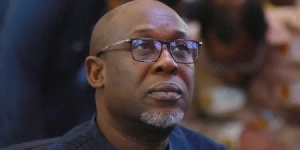- Boxing
- Athletics
- Basketball
- Bodybuilding
- Cricket
- Golf
- Handball
- Hockey
- Martial Arts
- Tennis
- Volleyball
- Other Sports

Art & Design of Tuesday, 15 April 2025
Source: www.ghanawebbers.com
Dr Bawumia planned to set up a minerals bank if he had won Election 2024- Miracles Aboagye
Dennis Miracles Aboagye, an aide to former Vice President Dr. Mahamudu Bawumia, criticized the Ghana Gold Board. He said it has failed to address the illegal mining crisis in Ghana.
Aboagye stated that if Dr. Bawumia had won the 2024 election, he would have created a Minerals Bank. This bank would provide structured solutions for illegal mining issues.
The Gold Board was established recently, receiving presidential assent on April 2, 2025. In an interview on JoyNews' AM Show, Aboagye expressed frustration over the board's lack of results. He highlighted its failure to formalize small-scale mining effectively.
He questioned the Gold Board's promises and pointed out that they were not fulfilled. “You said the Gold Board would do it, but have they done it?” he asked host Benjamin Akakpo.
Aboagye explained how Dr. Bawumia’s plan would have addressed these issues comprehensively. The Minerals Bank would offer financial resources and infrastructure for legal small-scale mining.
He emphasized that this approach would go beyond current systems that are ineffective against illegal mining challenges. “The government must put in place a system,” he said.
Aboagye suggested a social reorientation to help illegal miners understand galamsey's negative effects. He also called for alternative livelihoods for those willing to transition to legal mining.
The proposed Minerals Bank would supply miners with resources and machinery for efficient legal operations. It aimed to provide geological data to help miners locate gold deposits better.
This data could reduce environmental damage from indiscriminate mining practices. “Instead of just digging anywhere, they would have had data showing where the gold is,” Aboagye noted.
He added that the government should provide necessary machinery and financial support for local miners. This support could lessen their reliance on foreign miners.
A major issue raised by Aboagye was local miners' financial limitations. Many landowners in areas like Atiwa Forest lack capital for modern equipment.
Consequently, they often depend on foreign miners, particularly Chinese nationals, leading to exploitation of local workers and limited benefits for landowners.
“When Ghanaian landowners don’t have financial muscle, they rely on foreign miners,” he explained. “Even though our people are doing the mining, they get very little in return.”
Aboagye argued that Dr. Bawumia’s proposed Minerals Bank was essential for empowering local miners. It would provide access to capital and legal backing needed for independent operations.
This initiative could regulate small-scale mining and reduce environmental damage from illegal practices while equipping local miners with necessary tools.
Mr Aboagye believed Dr Bawumia’s approach through the Minerals Bank could change the game regarding illegal mining issues significantly. Unlike the ineffective efforts of the Gold Board, his plan aimed at tackling root causes and benefiting both local economies and environments.











